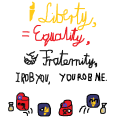This page is about the historical movement known as “radicalism”, for the political radicalism in general see Radicalism (Disambiguation).
"No human government has a right to enquire into private opinions, to presume that it knows them, or to act on that presumption. Men are the best judges of the consequences of their own opinions, and how far they are likely to influence their actions; and it is most unnatural and tyrannical to say, "as you think, so must you act. I will collect the evidence of your future conduct from what I know to be your opinions."
Radicalism (Rad) or Radical Liberalism (RadLib) was a historical set of movements within ![]() Classical Liberalism and represented the left-wing of the historical movement. Radical liberalism took principles behind liberalism and applied them to their conclusion (a.k.a. their 'root' or 'radix' and latin, therefore 'radicalism').
Classical Liberalism and represented the left-wing of the historical movement. Radical liberalism took principles behind liberalism and applied them to their conclusion (a.k.a. their 'root' or 'radix' and latin, therefore 'radicalism').
For example. a classical liberal might espouse that a ![]() democratic system of government and the right to vote should be given. In turn, a radical liberal would take such a statement to its conclusion, that being that
democratic system of government and the right to vote should be given. In turn, a radical liberal would take such a statement to its conclusion, that being that ![]() women,
women, ![]() those without property,
those without property, ![]() immigrants, slaves etc., should all be given the right to vote. Radical liberals also supported positive rights whereas classical ones only advocated negative ones. Moreover, radical liberals were historically the early advocates of
immigrants, slaves etc., should all be given the right to vote. Radical liberals also supported positive rights whereas classical ones only advocated negative ones. Moreover, radical liberals were historically the early advocates of ![]() welfare states.
welfare states.
By modern standards 'radicalism' is not radical at all, as the reforms made by radical liberals got accepted as the norm; in the modern-day 'radical liberal' is mainly used as an insult.
History
Radical Liberalism first took roots in America following the war of independence and was championed by founding father Thomas Paine. He called for many modern Social Liberal policies like a minimum wage and state pension as universal suffrage (including voting rights for women, which wasn't included in the original Constitution). Radical Liberalism was also practised in pre-Napoleonic France at the time, with similar policies.
Following the Napoleonic wars, radical liberalism would be the dominant ideology of non-classical liberals in democracy. The British Whigs also had a left-wing comprised of radicals and it could be said that Abraham Lincoln was one as well as the former American Whig party (replaced by Lincoln's republicans) and the abolitionist movement at large.
Radical liberal movements declined during the latter half of the 19th century as socialism became the dominant ideology of the left; some radicals became much more moderate and became ![]() social liberals and
social liberals and ![]() liberal democrats, while others joined the socialists and became
liberal democrats, while others joined the socialists and became ![]() liberal socialists and
liberal socialists and ![]() reformist marxists.
reformist marxists.
Establishment followed pattern of similar organizations such as Labour and Socialist International, adapted for various centrist parties. First constituent meeting of the International Entente of Radical and Similar Democratic Parties were organized on 29 August 1924 in Geneva under leadership of later Nobel Peace Prize awardee Ferdinand Buisson, who later acted as the President of the executive committee.[4]
Doctrine
Radical Liberals, in the framework of ![]() Classical Liberalism, believe in civil liberties such as
Classical Liberalism, believe in civil liberties such as ![]() voting elections,
voting elections, ![]() equality before the law, and
equality before the law, and ![]() religious tolerance, but they usually fall into such positions that extended suffrage, positivism and rationalism,
religious tolerance, but they usually fall into such positions that extended suffrage, positivism and rationalism, ![]() welfare for all and any higher sense of just are necessary reforms. These policies are seen as
welfare for all and any higher sense of just are necessary reforms. These policies are seen as ![]() Progressive then and now, Radical Liberals viewed
Progressive then and now, Radical Liberals viewed ![]() Conservative or
Conservative or ![]() Monarchist ideologies as protecting the broken system, one unjustified in its nature and needed to be overthrown with social change. This paved the way for modern
Monarchist ideologies as protecting the broken system, one unjustified in its nature and needed to be overthrown with social change. This paved the way for modern ![]() Social Liberalism.
Social Liberalism.
Radicalists was just the general trend of more staunch Liberals that would define the left. They vary in every country, ranging from the radical ![]() French Republicans to the British quasi-Christian Socialism
French Republicans to the British quasi-Christian Socialism ![]() to the Italian National positivism. Supportive of the redistribution of property and workers' rights, they influenced some
to the Italian National positivism. Supportive of the redistribution of property and workers' rights, they influenced some ![]() Socialist ideologies along the way. Ironically, Radlibs were against common ownership.
Socialist ideologies along the way. Ironically, Radlibs were against common ownership.
Variants
 Chartism
Chartism
Chartism was a radical, socialist political movement in the early 1800s in Britain. It had the popular support of the British working class and was particularly in Northern England, the East Midlands, the Staffordshire Potteries, the Black Country and the South Wales Valleys. They even tried to launch attempted revolutions in South Wales and Yorkshire.
Eventually the Chartist movement stagnated and failed due to government repression.
 Radical Republicanism
Radical Republicanism
Radical Republicans were a faction within the early ![]() Republican party that existed from the party's founding in 1854 to the end of Reconstruction. They were called radicals due to their goal of ending slavery without compromise. During the Civil War they clashed with moderate Republicans led by
Republican party that existed from the party's founding in 1854 to the end of Reconstruction. They were called radicals due to their goal of ending slavery without compromise. During the Civil War they clashed with moderate Republicans led by ![]() Abraham Lincoln who wanted to compensate slave owners for their freed slaves where as radicals wanted no compensation for slave owners. After the Thirteenth Amendment, Radicals pushed to pass the Fourteenth Amendment granting citizenship rights to all former slaves and establish civil rights for former slaves. Radicals opposed allowing ex-Confederate soldiers to hold political office and brought impeachment charges against
Abraham Lincoln who wanted to compensate slave owners for their freed slaves where as radicals wanted no compensation for slave owners. After the Thirteenth Amendment, Radicals pushed to pass the Fourteenth Amendment granting citizenship rights to all former slaves and establish civil rights for former slaves. Radicals opposed allowing ex-Confederate soldiers to hold political office and brought impeachment charges against ![]() Andrew Johnson. Radicals supported the Presidency of
Andrew Johnson. Radicals supported the Presidency of ![]() Ulysses S. Grant and led Reconstruction efforts until they were effectively ended with the results of the 1876 Presidential Election.
Ulysses S. Grant and led Reconstruction efforts until they were effectively ended with the results of the 1876 Presidential Election.
 Radical Socialism
Radical Socialism
In the years following the advent of the Third Republic, a political movement which constituted the left wing of radicalism. Designates more particularly, within the radical Republican and radical-socialist parties or the movements which arise from them, the tendencies close to reformist socialism.[5]
 O'Higginism
O'Higginism
W.I.P
As a pejorative
W.I.P
Personality
Radicalism behaves like a 90's "cool kid" rebel that speaks with similar lingo and slang. Particularly he prides himself on being a radical rebel, saying that his ideas and policies are groundbreaking and revolutionary, when in reality they are mild and moderate, as they have become the norm over the last century and a half.
How to Draw

- Draw a ball
- Fill it with dark blue
- Draw a rose in yellow
- Draw the eyes and you're done!
| Color Name | HEX | RGB | |
|---|---|---|---|
| Dark Blue | #37356D | 55, 53, 109 | |
| Gold | #FFDC23 | 255, 220, 35 | |
Relationships
Cool
 Radical Democracy - Dude, Radical Democracy is the best! Like, everyone should have a voice.
Radical Democracy - Dude, Radical Democracy is the best! Like, everyone should have a voice. Welfarism - Giving poor people free money? That sounds totally rad!
Welfarism - Giving poor people free money? That sounds totally rad! National Liberalism - 1848 best year of my life!
National Liberalism - 1848 best year of my life! Liberal Feminism - Yeah, I'm such a radical liberal that I believe women should have the right to vote. You go girl!
Liberal Feminism - Yeah, I'm such a radical liberal that I believe women should have the right to vote. You go girl! Social Liberalism - My COOL direct successor who carried on my COOL ideals!
Social Liberalism - My COOL direct successor who carried on my COOL ideals! Liberal Socialism - Yeah bro, combining liberalism with socialism is totally awesome!
Liberal Socialism - Yeah bro, combining liberalism with socialism is totally awesome! Jacobinism - Sock it to the monarchy! But why did you put Paine in Jail?
Jacobinism - Sock it to the monarchy! But why did you put Paine in Jail? Philosophical Anarchism - Extremely radical bro that also supported the French Revolution.
Philosophical Anarchism - Extremely radical bro that also supported the French Revolution. Peelitism -Thanks for coming to my rad party!
Peelitism -Thanks for coming to my rad party! Civil Libertarianism - Well done bro! Abolish slavery in America and compensate suffrage to the enslaved!
Civil Libertarianism - Well done bro! Abolish slavery in America and compensate suffrage to the enslaved! Jeffersonian Democracy - Despite being a hypocritical slaveowner,Jefferson is still one of my only good friends,after
Jeffersonian Democracy - Despite being a hypocritical slaveowner,Jefferson is still one of my only good friends,after  these
these  guys gave up on me.
guys gave up on me.
Semi-Cool
 Classical Liberalism - My AWESOME father taught to me the AWESOMENESS of liberalism and democracy! But is pretty boring ngl, he doesn't even want to kill monarchs with me anymore.
Classical Liberalism - My AWESOME father taught to me the AWESOMENESS of liberalism and democracy! But is pretty boring ngl, he doesn't even want to kill monarchs with me anymore. One-Nation Conservatism - Tory Radicalism? What the heck dude?
One-Nation Conservatism - Tory Radicalism? What the heck dude? Kemalism - Son of my
Kemalism - Son of my  friend but you are pretty authoritarian and not really liberal at all dude.
friend but you are pretty authoritarian and not really liberal at all dude. But as the French Radical Party, that doesn't change the fact that I'm in love with you. That's why we invited you to the Radical International.[6] Revolutionary Progressivism - Progress is cool and all but DAMN, bro, you need to chillax.
Revolutionary Progressivism - Progress is cool and all but DAMN, bro, you need to chillax. John Brown was cool AF tho. Marxism - Why, like, did you leave me for
Marxism - Why, like, did you leave me for  him? I'm WAY cooler, man!
him? I'm WAY cooler, man!
Uncool
 Anti-Radicalism - That's not cool man!
Anti-Radicalism - That's not cool man! Classical Conservatism - Boring McDuck Face!
Classical Conservatism - Boring McDuck Face! Conservatism - You’re as uncool as your dad.
Conservatism - You’re as uncool as your dad. Conservative Liberalism - He and I actually used to be bros, but then he ended up turning against me. Not cool, dude![Note 2]
Conservative Liberalism - He and I actually used to be bros, but then he ended up turning against me. Not cool, dude![Note 2] Reactionaryism - Literally my opposite. NOT cool.
Reactionaryism - Literally my opposite. NOT cool. Reactionary Liberalism - WTF?!
Reactionary Liberalism - WTF?! White Nationalism - You claim to be in the Kool Kids Klub but dude, that's SO uncool!
White Nationalism - You claim to be in the Kool Kids Klub but dude, that's SO uncool! Alt-Lite - Hijacking is not cool.
Alt-Lite - Hijacking is not cool. National Radicalism - Dude, why are you stealing my name!? Your ideas aren't even cool, man, you're just like the guy above.
National Radicalism - Dude, why are you stealing my name!? Your ideas aren't even cool, man, you're just like the guy above. Conservative Socialism &
Conservative Socialism &  Post-Leftism - Dudes, I am NOT
Post-Leftism - Dudes, I am NOT  them.
them.
Gallery
Portraits
-
Original
-
Radlib
Comics and Artwork
Further Information
Texts
- Speeches of Right Honourable Charles James Fox by Charles James Fox
- The People's Charter
- Discourse on Inequality & The Social Contract by Jean-Jacque Rousseau
- Emile, or On Education by Jean-Jacques Rousseau
Wikipedia
- Radicalism (historical)
- Radical Whigs

- Radicals (UK)
- Italian Radical Party
- Historical Far Left
- Radical Party (France)
- Foxite
- Charles James Fox
- Ministry of All the Talents
- Transnational Radical Party
- Radical Civic Union
Notes
- ↑ Hugo believed in Colonialism as a means to end slavery and to "civilize" the Africans.
- ↑ This references to the break between
 Edmund Burke and
Edmund Burke and  Charles James Fox, who were once great friends but never reconciled due to their differing opinions on the
Charles James Fox, who were once great friends but never reconciled due to their differing opinions on the  French Revolution.
French Revolution.
References
- ↑ I am said to be a revolutionist in my sympathies, by birth, by breeding and by principle. I am always on the side of the revolutionists, because there never was a revolution unless there were some oppressive and intolerable conditions against which to revolute.
- ↑ "The Boxer is a patriot. He loves his country better than he does the countries of other people. I wish him success."
- ↑ Whilst opposing American expansion, Marti was influenced by the American Revolution
- ↑ [1]
- ↑ [2]
- ↑ Edouard Herriot, the head of the French Radical Party and the French prime minister, said the following during his trip to Turkey in August 1933:
“I am especially a fan of the idea of Laicism, which His Excellency Gazi holds as the basis for renewing the spirit of the country. Because this is one of the fundamentals of the French revolution.”
“...You see, I am your oldest friend, I shared my opinion in 1913.
I didn't change it. Because I have not seen any action other than what I thought from the Turkish nation. I am secular [laicist] and Radical. You are also secular [laicist] and radical...” “...There is no doubt that your Great Chief Gazi Mustafa Kemal is the most revolutionary man in the world...”
“I have not yet had the honor of meeting His Excellency Gazi. But every person is measured by his works. The works of the veteran are in the square. In particular, his decision to abolish the caliphate and sultanate as the first stage of the revolution gave the necessary idea about the greatness of Gazi and recorded it in history. I am a fan of Gazi. Why do we need to say anything more?”
“I examined the program of the Republican People's Party. I found it very beautiful. It is working well. I congratulate you and wish you success.”
Yusuf Hikmet Bayur tells the following memory about Edouard Herrriot:
“In the summer of 1933, while Atatürk was in Istanbul, Herriot, one of the former French prime ministers, came there. Atatürk received him at Dolmabahçe Palace. Minister of Foreign Affairs Tevfik Rüştü Aras was also there. I acted as the translator in my capacity as Secretary General. Herriot was very respectful, and a great sense of sympathy was felt in every word. While talking about various state affairs and secularism, the former French Prime Minister said: 'How can I not admire you? You expelled the Caliph; However, the Pope's representative in Paris (nonce apostolique, English: Nuncio) said, 'He overthrew my government.'
The text of a conference given by Édouard Herriot in France was published in the magazine "La Turquie Kemaliste". In this lecture he gave in 1933, Herriot talks about Mustafa Kemal Pasha and the 1924 Constitution as follows:
“No one who will examine this constitution can deny its liberal and democratic character. Talking about a dictatorship is completely ridiculous. The authority of the veteran consists of the feelings of gratitude that the people feel towards him. If this is a dictatorship, let us admit that it is legal and even desirable.”
Source: Doctoral Dissertation Relationship of Republican People’s Party with Parties from Other Countries (1923-1950), University of Dokuz Eylül Institute of Social Sciences Department of History Doctoral Program, Murat TURAN, İzmir-2016.
| | |




